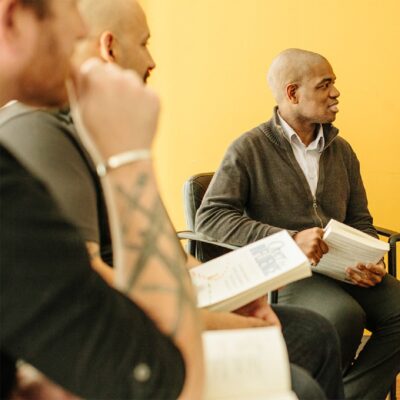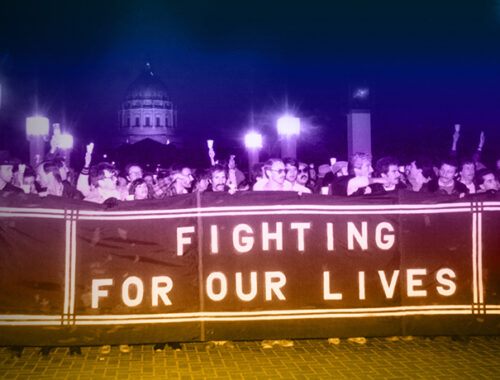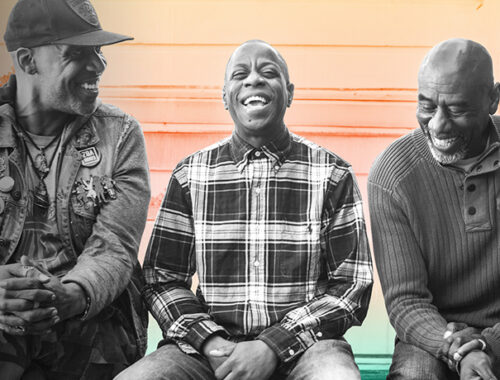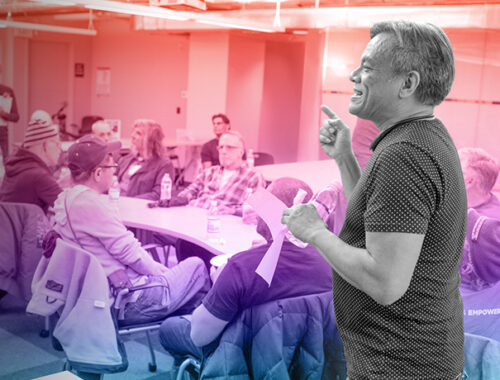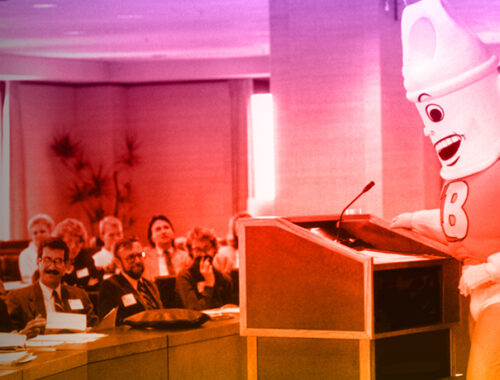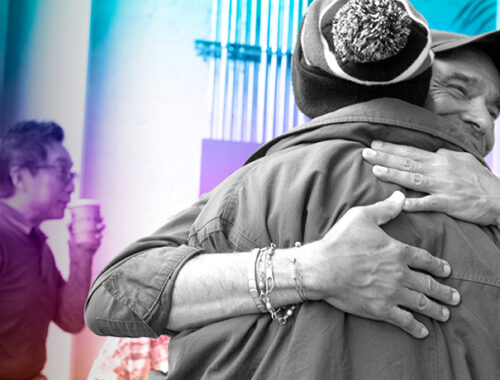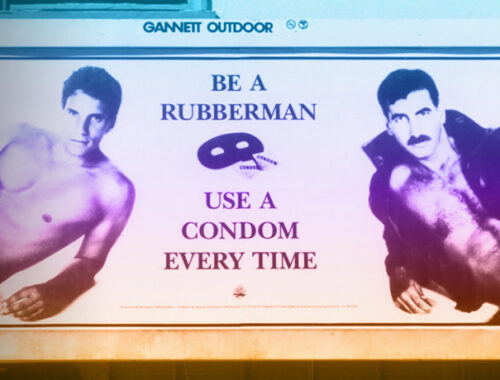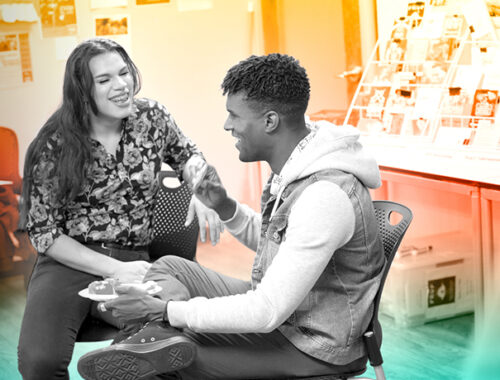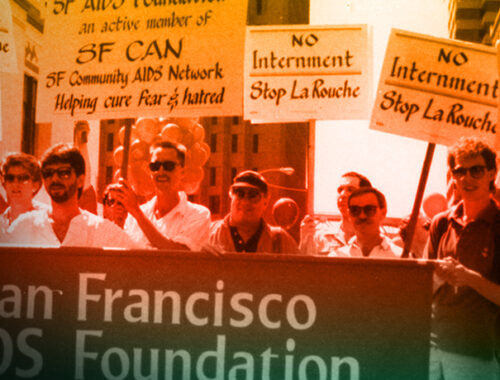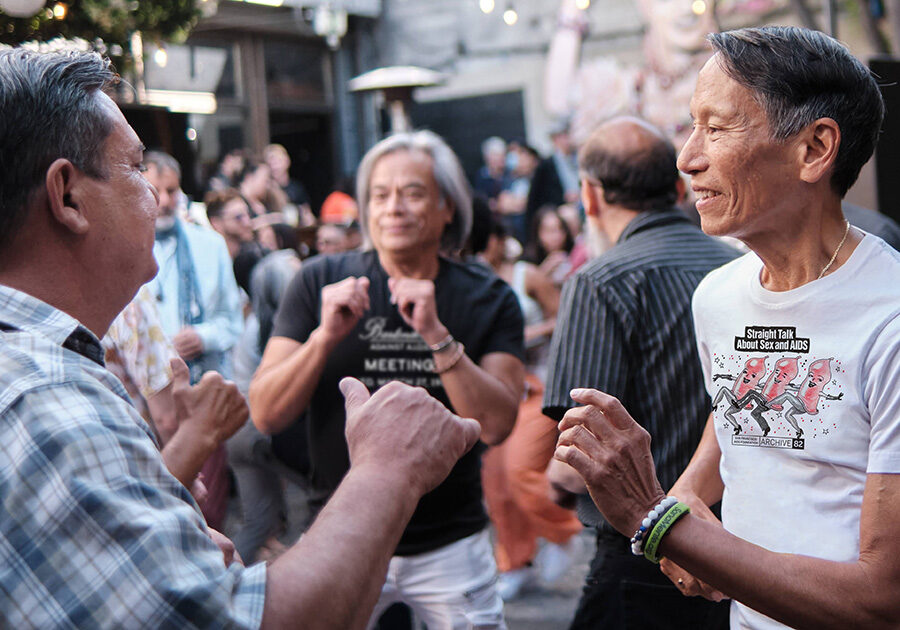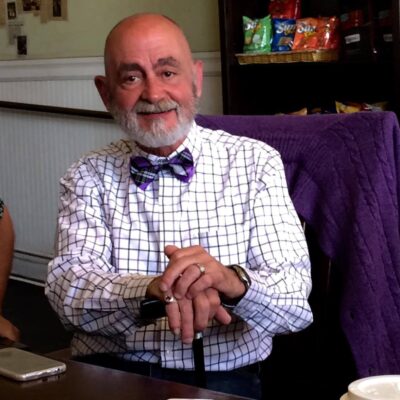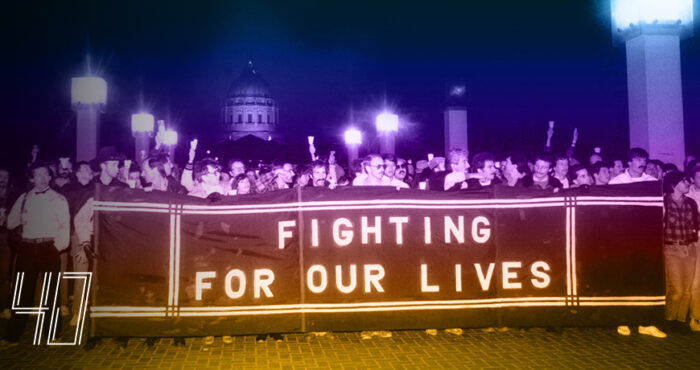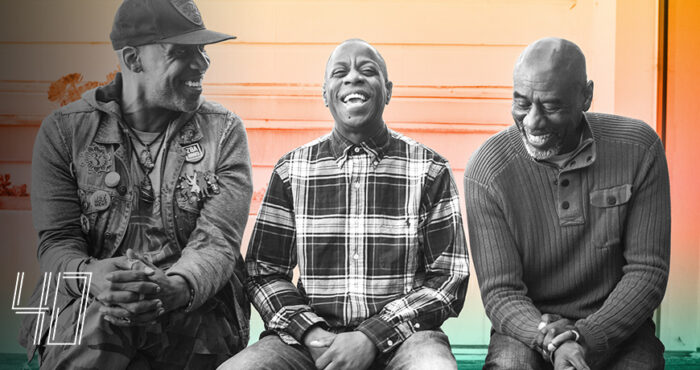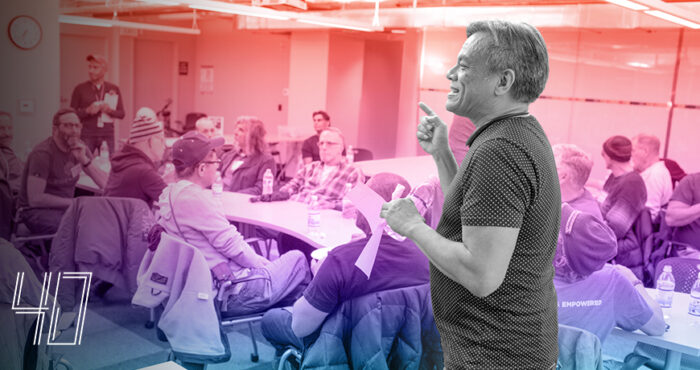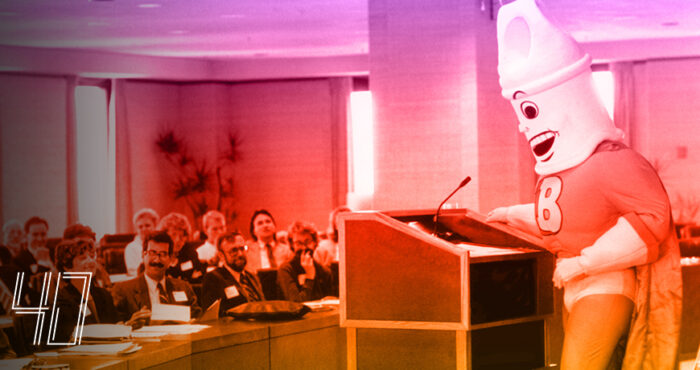Harvey Milk Taught Us the Power of Partnerships
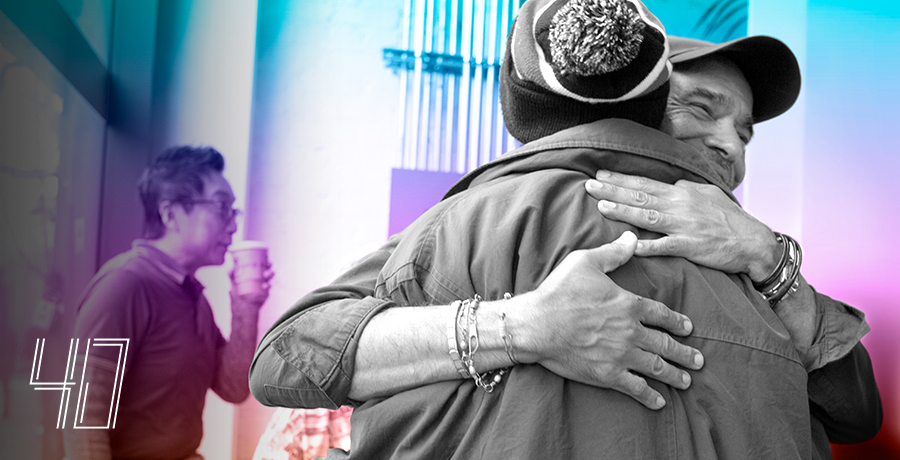
This article was produced in honor of San Francisco AIDS Foundation’s 40th anniversary, which we are commemorating in 2022.
Harvey Milk understood the power of partnerships. An important part of his legacy to all of us is the lesson that people can achieve bigger, more far-reaching things when we work in partnerships, collaborating with like-minded folks and groups who share similar goals, than working alone. He taught us how to do that with the Coors beer boycott.
The boycott began as a local labor matter in Boulder Colorado, Coors’ home base, in the late 1960s. During the 1970s, it expanded to cover most of the western United States, with support from the Latino community, African Americans, women’s rights groups, as well as labor unions. LGBTQ rights groups got involved in the boycott, after information surfaced about Coors’ discriminatory hiring practices.
Here in San Francisco, Allan Baird (President of Teamsters Local 921, which had organized Coors distribution workers in San Francisco) worked with activist Howard Wallace, an openly gay truck driver and Teamsters member, to organize a large-scale boycott in the Bay Area. Harvey met with Baird in 1973 and helped to coordinate the boycott, strengthening the alliance between the traditionally conservative Teamsters union and the area’s LGBTQ community. Coors beers disappeared from gay bars in the city—and to this day, it is difficult to find Coors in any San Francisco gay bar.
The boycott severely impacted Coors’ bottom line; Coors made concessions, including in their hiring practices. In return for the LGBTQ community’s support of the boycott, Harvey entreated the Teamsters to hire openly gay people and to oppose the Briggs Amendment, a California ballot measure that would have banned LGBTQ teachers from employment. Activist Cleve Jones has said that the Bay Area boycott was the first-ever instance of collaboration between labor unions and the gay rights movement.
It was also the template that Harvey left us for successfully organizing and acting to achieve common goals, a template that has yielded many successes in the fight against HIV and AIDS. Over forty-plus years, we have learned that we are stronger and more productive when we overcome destructive squabbles and avoid turf wars with others in the fight. Working together, AIDS service organizations (ASOs), community-based organizations (CBOs), groups representing people living with HIV and AIDS, medical researchers, healthcare providers, governmental bodies, artists, and activists can achieve infinitely more than any can achieve on its own. We’ve seen proof of that success very recently in San Francisco.
During the two-and-a-half years (and counting) of the COVID-19 pandemic, San Francisco — once upheld as a model for HIV and AIDS prevention and treatment — saw troubling setbacks for the HIV community. The rate of testing dropped by 44%, as sheltering in place prevented many people from getting to a clinic for testing; the percentage of people living with an undetectable viral load dropped (from 75% to 70%), especially among people experiencing homelessness (from 50% to 20%); PrEP use declined significantly; and long-term survivors of HIV and AIDS still lacked adequate access to deeply affordable housing, harm reduction, mental health care, social housing, and economic assistance. All the while, some funds and personnel were taken away from HIV and AIDS work and reassigned to the COVID response. While that reallocation of resources was certainly understandable in the circumstances, unintended consequences hit the HIV community hard.
In order to highlight and reverse those setbacks, a coalition of groups got together and heeded the call.
The HIV Caucus of the Harvey Milk LGBTQ Democratic Club formed in June 2021 under the guidance of long-time Milk Club member and activist Michael Rouppet. Its goals include building political power for the HIV community by pressuring elected officials on policy priorities; encouraging the building of coalitions among people living with HIV to advocate for policy priorities; and securing progressive HIV policy outcomes and funding levels at local, state, and federal levels. With the Caucus’s encouragement, the Milk Club endorsed and adopted The San Francisco Principles 2020, a manifesto modeled after The Denver Principles 1983 (“Nothing About Us Without Us”), outlining the specific challenges faced by long-term survivors of HIV and AIDS and our demands to address those challenges. One step toward a powerful coalition had been taken.
On December 1, 2021, at a commemoration of World AIDS Day at City Hall, Dr. Monica Gandhi, the medical director of the HIV Clinic at SFZGH (“Ward 86”), enlisted the aid of the Milk Club and the HIV Caucus to bring San Francisco’s attention to the setbacks in HIV testing and treatment. She specifically urged us to conduct an “ACT-UP style action” to grab the San Francisco Board of Supervisors’ attention and to demand that San Francisco treat the HIV community as “a population with the greatest social need,” as defined by Senate Bill 258 (the HIV & Aging Act).
Dr. Gandhi had previously told me in an interview, “I think the HIV treating community, i.e., healthcare workers, need to team up with activists, community, and patients like we did in the 80’s to again raise awareness that HIV is not over and that more resources and support should go towards HIV/AIDS. Our strength in HIV activism has always been researchers, clinicians, patients, advocates and activists working together. We need to do this again to ‘take back’ HIV as a major priority in our city.” A long-time ally and advocate, Dr. Gandhi became an important partner in the “Back to HIV” rally and die-in scheduled for March 2022.
In January 2022 newly elected HIV Caucus Chair Paul Aguilar (one of the busiest HIV/AIDS activists in the country) got to work. An activist since he was 18 years old, Paul understands the need for collaboration among the various warriors fighting HIV/AIDS and its effects. “As in any war, you win only if you work together on many different fronts. For instance, the needs of an individual diagnosed 25 or 30 years ago, and has been on numerous medications for years, are very different from someone’s who was diagnosed just last year or even 10 years ago. Those are different fronts that need our work. The principle benefit of collaboration among providers and Community stakeholders is the ability to address the plethora of issues facing people living with HIV and AIDS.”
With that in mind, Paul approached the San Francisco AIDS Foundation’s HIV Advocacy Network (HAN), who quickly signed on to the March action and provided organizational help as well as several volunteers to attend the rally/die-in. Paul also approached the HIV & AIDS Providers Network (HPAN) who gave their endorsement as well.
On March 21, 2022, the “Back to HIV” rally descended upon City Hall, demanding a hearing at the Board of Supervisors to address the impact of the COVID-19 pandemic on HIV/AIDS services, prevention, and treatment. Dr. Gandhi gave an impassioned plea for refocusing on HIV/AIDS to the crowd of members and sponsors from the HIV Caucus, the Harvey Milk LGBTQ+ Democratic Club, HAN; co-authors of The San Francisco Principles, Shanti’s Honoring Our Experience, San Francisco AIDS Foundation, the National AIDS Memorial, the Alice B. Toklas Democratic Club, HealthRight 360, and Zuckerberg San Francisco General Hospital’s Ward 86. Press coverage extended to the gay press, the local press, and the local television news broadcasts.
Early in May 2022, Supervisor Hillary Ronen held a meeting of the Budget Committee to determine the extend of COVID-19’s impact on HIV/AIDS services in the city. Members from HAN, SFAF, and the Principles testified to the urgency of funding HIV/AIDS services. As a result, later in May, the Board of Supervisors passed a resolution supporting The San Francisco Principles 2020 and the Getting to Zero initiative and calling for sustaining the HIV/AIDS safety net services. In June 2022, Mayor London Breed unveiled her budget proposal, guaranteeing $3.3 million for HIV/AIDS prevention and treatment for fiscal year 2022-23 and another $3.3 million for fiscal year 2023-24. Her budget also incudes requested funds for mental healthcare services for the city’s long-term survivors.
Attention was paid! A coalition of political groups, ASOs, CBOs, PLWHA groups, healthcare providers, elected representatives, artists and activists achieved this major re-funding of HIV/AIDS services in the city by joining forces to capture the Board of Supervisors’ and the Mayor’s attention, and demanding that the issue be addressed pronto.
But one small victory in securing funding is clearly not enough. People living with HIV and AIDS, including long-term survivors, and other stakeholders must continue to coalesce around common goals to reach both short- and long-term goals.
To that end, on July 18, 2022, at the invitation of Diane V. Havlir, MD, Director of the AIDS Research Institute, representatives from HAN, San Francisco AIDS Foundation, and the Principles met online with the Steering Committee of the Getting to Zero Consortium (G2Z). G2Z has already made progress in their stated goal of a 90% reduction in new transmissions and AIDS-related deaths by 2025; the ultimate goal, of course, is zero deaths, zero new transmissions, and zero HIV/AIDS stigma. G2Z has already had success in getting treatment to newly diagnosed immediately upon diagnosis, making that the standard model for beginning treatment, and increasing community engagement with PrEP. The Consortium has recently initiated an “HIV and Aging” committee to address the issues specific to long-term survivors and others aging with HIV. She acknowledged the importance of coalitions in reaching common goals.
“Cooperation and collaboration accelerate our collective goals of improving lives of person with HIV and preventing new infections,” Dr. Havlir told me. “San Francisco and the AIDS community has demonstrated locally and globally to governments, scientists/doctors, communities and the private sector that this model of bringing persons together with different backgrounds and expertise working towards common goal (collective impact) gives results. This approach takes effort, humility, commitment and perseverance.”
Going forward, Dr. Havlir said, “the challenges are great, but we will not shy away from them when there are solutions within reach and ones we need to create. Looking forward to continued collaboration.”
The needs of people living with HIV/AIDS change constantly. Especially for the generation of people living with HIV and AIDS who were diagnosed before the advent of HAART in 1996, keeping up with and meeting those needs will require intensive, goal-driven collaboration and partnerships among all stakeholders in the pandemic. Continued collaboration? Yes, please.
Commemorating 40 years
Join us every month in 2022 as San Francisco AIDS Foundation marks 40 years of service to the community.
On this occasion, we take a look back and share our storied history of leadership in HIV prevention, education, advocacy, and care, and HIV history in San Francisco and the Bay Area since the beginning of the epidemic.
As we look back on our history, we approach the future with hope, and with a renewed sense of all that our passion and ingenuity can bring to enact positive change in our community. We will act in bold and brave ways to reach an end to the AIDS epidemic, and ensure that health justice is achieved for all of us living with or at risk for HIV.
After 40 years, we will not lose sight of our commitment to our community, and our vision for a brighter future.




